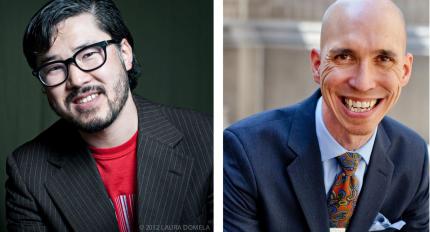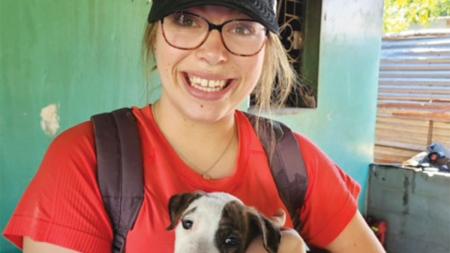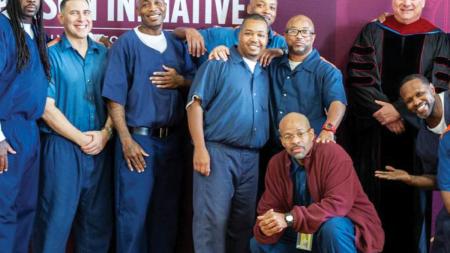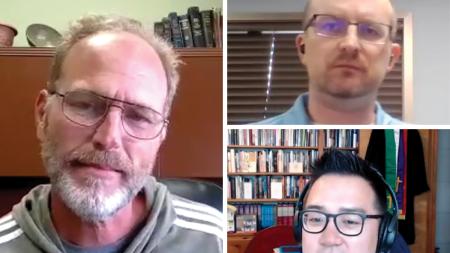Reaching Out to the World

Eugene Cho (left) and Jeremy Courtney (right)
Calvin College
Motivated by their Christian faith, Eugene Cho and Jeremy Courtney have launched efforts to alleviate poverty, build communities, and bring help and healing to such places as Aleppo, Syria.
Cho is a cofounder of the international anti-poverty organization One Day's Wages. Courtney is cofounder and executive director of the Preemptive Love Coalition, an international development organization based in Iraq.
In separate talks at Calvin College’s 2017 January Series, Cho and Courtney spoke about experiences in different parts of the world that spurred them on to follow the lead of Jesus, who told his followers to care “for the least of these” (Matt. 25:40).
For Cho, lead pastor of Quest Church in Seattle, Wash., it happened a few years ago in Myanmar, also known as Burma.
On a visit there, he met a group of Karen people living in a remote jungle village. They told him about the violence that they and other ethnic groups had been suffering at the hands of government forces. Thousands of people had been killed.
“They talked of genocide. The world remained silent. It didn’t know what was going on,” said Cho.
Cho recalls walking into a small classroom in that village to see students sitting on rickety chairs and looking hungry and scared. Even worse was a poster at the front of the room with pictures showing people with mutilated limbs.
“These were awful pictures of people who were victims of landmines,” said Cho. “The poster was used to teach the children about them.”
When he returned home, he told his wife, Minhee, what he had seen, and they, along with their three children, committed to pray, asking God what they could do to help in such places as Myanmar.
“What we heard from the Spirit didn’t sit well with us at first,” he said. “The Holy Spirit was challenging us to give up a year’s wages. I realized then that I was probably more in love with the idea of following Jesus then actually following Jesus.”
His wife was a homemaker at the time, and as a pastor he was making $68,000 a year. It took them three years of cutting costs, selling off many things, and even renting out their home for awhile and living with church members, to reach $68,000.
And when they reached their goal, they used it to start One Day’s Wages, a nonprofit grassroots organization that has been able to raise $5 million and help more than 520,000 people worldwide in the past three years, said Cho, author of Overrated: Are We More in Love with the Idea of Changing the World Than Actually Changing the World?
“Our theology of justice matters; it ultimately informs how we live our lives,” said Cho. “It is the heart of the gospel. We can’t speak of God without speaking of love.”
For Courtney, the moment of truth came in 2007 after he and his wife, Jessica, and their family moved to Iraq after living and working in Turkey, where they had been involved in economic development efforts.
“As the American project in Iraq wasn’t going well, we felt compelled to move into a neighborhood in a city in Iraq and be part of the solution,” he said.
It was then that he met a man whose child was suffering from a large hole in her heart. He told Courtney there were no doctors available to save her life. Pediatric cardiology wasn’t even available in the country to diagnose the child’s health problems.
“I told him we would see what we could do,” said Courtney, who worked at the time for an aid organization. “We learned that hundreds of children across Iraq had life-threatening heart defects, with no one to provide treatment.”
So, with the help of his friends and others, he enlisted the help of doctors from many countries “to brave the bullets to come and do what they could to serve these kids.”
Doctors came and have saved the lives of more than 600 children.
Meanwhile, he and others founded the Preemptive Love Coalition, which branched out from the medical mission to provide resources to people affected by war in places like Mosul and Fallujah, said Courtney.
“What we saw in Iraq was a huge humanitarian crisis unfolding all around us. Millions of people were driven out their homes. . . . We responded by bringing food and medicine to people fleeing the conflicts.”
Currently the coalition is at work on the ground in Syria, driving the streets of a bombed-out Aleppo, finding people who need help, and feeding as many as 50,000 people a day.
“There are airstrikes above and terror below and various groups trying to overthrow each other, but we are feeding the people and are buying five ambulances to be used in the city. We will begin programs to put the plumbers and the electricians and others back to work,” he said.
Asked why he and his wife have remained in Iraq, which is still torn by conflict, and are now reaching out in Syria, Courtney tells people it is what Jesus would have them do.
“Preemptive love is the way we join with God for eternity. It is God who is big enough to put Iraq and Syria back together and even to put together our own hearts,” said Courtney. The organization’s motto, he said, is “Love first, ask questions later.”
But, said Courtney, people don’t need to go overseas and involve themselves in conflict and poverty in such places as Iraq or Syria in order to practice preemptive love — a type of love that calls people to face and walk through their fears in order to join with and practice the love of Jesus.
Rather, he said, people ought to stay where they are, to face their fears of what it might mean to involve themselves in the tough, hard places in their own communities, and get busy trying to make a difference.
“We are all bound up with one another,” said Courtney. “If I reach the point of conviction, I need to pursue it. . . . Take this message to love to the uttermost in your own communities. Love those who come to us and to whom we must be hospitable.”


